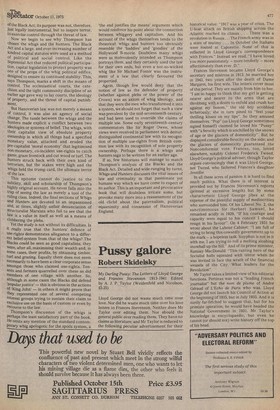Pussy galore
Robert Skidelsky
My Darling Pussy: The Letters of Lloyd George and Frances Stevenson 1913-1941 Edited by A. J. P. Taylor (Weidenfeld and Nicolson, £5.25)
Lloyd George did not waste much time over love. Nor did he waste much time over his love letters to Frances Stevenson. Neither does Mr Taylor over editing them. Nor should the general public over reading them. They have no claims as literature; and Mr Taylor is reduced to the following peculiar advertisement for their historical value: "1917 was a year of crisis. The U-boat attack on British shipping across the Atlantic reached its climax . . . There was a revolution in Russia ... The French army was in a state of mutiny . . In October the Italians were routed at Caporetto. None of this is reflected in Lloyd George's correspondence with Frances." Instead we read, "I have loved you more passionately — more tenderly — more affectionately than ever. D."
Frances Stevenson became Lloyd George's secretary and mistress in 1913; he married her in 1943, two years after the death of Dame Margaret, his first wife. The letters cover most of this period. They are mainly from him to her. "I am so happy to think that my girl is getting nearer and nearer to the arms that are throbbing with a desire to enfold and crush her against my bosom," the old boy scribbled lecherously; she in turn pined to "feel your thrilling kisses on my lips". So they amused themselves. "Pop" (as Lloyd George sometimes signed himself) claimed he loved his "Pussy" with "a ferocity which is unchilled by the snows of age or the glaciers of domesticity". But he displayed considerable ferocity on the side; and the glaciers of domesticity guaranteed the Noncomformist vote. Frances, too, loved elsewhere, notably Colonel Frederick Tweed, Lloyd George's political adviser; though Taylor argues convincingly that it was Lloyd George, not Tweed, who fathered Frances's daughter Jennifer.
In all these acres of passion it is hard to find much politics. What there is of interest is provided not by Frances Stevenson's reports (printed at excessive length) but by some characteristic Lloyd George jibes at the expense of the plentiful supply of mediocrities who surrounded him. Of his Liberal No. 2, the sanctimonious Sir Herbert Samuel, he remarked acidly in 1929, "If his courage and capacity were equal to his conceit I should resign in his favour". On 4 February 1931 he wrote about the Labour Cabinet: "I am full of trying to bring this cowardly government up to the mark — a hopeless task. Sisyphus is not in it with me. I am trying to roll a melting sloshing snowball up the hill." And of its prime minister, Ramsay MacDonald: "This ranting hero of the Socialist halls squealed with terror when he was invited to face the wrath of the financial weasels of the City. What leaders for the Revolution".
Mr Taylor takes a limited view of his editorial functions_ Pertinax was not a "leading French journalist" but the nom de plume of Andrd Geraud of L'Echo de Paris who was. Lloyd George did not launch his Council of Action at the beginning of 1935, but in July 1935. And it is surely far-fetched to suggest that, but for his prostate operation, he would have headed the National Government in 1931. Mr Taylor's knowledge is encyclopaedic, but even he cannot (or should not) write history off the top of his head.


































 Previous page
Previous page